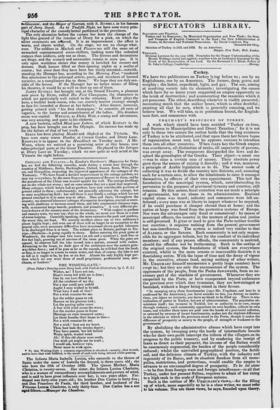eurien.
WE have two publications on Turkey lying before us ; one by an Englishman, one by an American. The former, deep, grave, and weighty ; the latter, superficial, light, and gay. The one, aiming at resolving society into its elements ; investigating the causes which have for so many years supported an empire apparently on the blink of destruction; and enumerating the resources which it yet possesses. The other, describinsr'' whatever is visibly presented ; recounting much that the author hears; which is often doubtful ; painting all that he sees, which is generally amusing, and we believe true. We will take, as in patriotism bound, the English- man first, and commence with URQUHART'S RESOURCES OF TURKEY.
A work which should have been entitled " Turkey en beau, and Success to Municipalities and Direct Taxation ;" for it is not only to these two causes the author holds that the long existence of Turkey is to be attributed, and that upon them her future hopes of regeneration must rest, but he appears anxious to introduce them into all other countries. When (says he) the Greek empire was overthrown, all distinction of ranks, all superiority of persons, was swept away. The conquerors disregarded the laws and de- spised the genealogies of the Greeks. Their object—a usual one —was to raise a certain sum of money. Their absolute power gave them the means of raising it directly ; and it was, moreover, a principle of Arabic legislation so to do. The easiest mode of collecting it was to divide the country into districts, and, assessing each for a certain sum, to allow the inhabitants to raise it amongst themselves, by officers of their own appointment. This laid the foundation of the municipal system, which, notwithstanding its perversion to the purposes of provincial tyranny and exaction, still remains. By this means, fiscal extortion was not made a principle of ;government, but an abuse in its administration. Realized capital alone was taxed; industry and commerce were left un- fettered; every man was at liberty to import whatever he required, if he could purchase it cheaper abroad than at home; and the nation at large was freed from the protective systems of Europe. Nor were the advantages only fiscal or commercial : by means of municipal officers, the country in the matters of police and justice is self-governed. It gives or need to give the Porte neither trouble nor exertion ; it requires nothing from the general government but non-interference. The system is indeed very similar to that of ALFRED, or the Saxons. Each community is not only respon- sible for its aggregate tribute, but for the conduct of its individual
members; and if person offends, the community is mulcted, should the offender not he forthcoming. Such is the outline of the original system, the foundations of which are everywhere existent, whilst in the more remote or inaccessible districts it is flourishing entire. With the lapse of time and the decay of vigour in the executive, abuses (and, saying nothing of other writers, Mr. URQUHART himself enumerates a pretty large number) have crept in; but they are only the excrescences of the system. The oppressors of the people, from the Pasha downwards, form no ne- cessary part of the machine of government. Whenever they are suspected by the Porte, or have exasperated beyond endurance the province over which they tyrannize, they are bowstringed or banished, without a finger being raised in their favour.
"In sweeping away these functionaries (says Mr. Urquhart, and here he is confirmed by the American), you burst asunder no ties, you destroy no institu- tions, you injure no interests, you leave no blank to be filled up. There is cen- tralization of power in Turkey, but not of administration. The population ad- ministers itself; has recourse to Turkish law or authority in no case, except through violence; each community apportions its own burdens, collects its own taxes, and whether these taxes are paid into the hands of a provincial collector, or extorted by swarms of locust functionaries, makes not the slightest difference in the relations in which the provinces stand to the Porte, though it makes the difference of prosperity or misery to the people, of strength or weakness to the government."
By abolishing the administrative abuses which have crept into the system, by sweeping away the horde of intermediate locusts who for their own profit intercept the tribute of the villagers on its progress to the public treasury, and by rendering the receipt' of taxes as direct as their payment, the income of the Sultan would be enormously augmented, the burden of the people considerably reduced; whilst the unrivalled geographical position, the fertile soil, and the delicious climate of Turkey, with the industry and ingenuity of its Rayas, and its absolute freedom from all mono- polies, restrictions, and protections, would enable the empire to advance to an unexampled degree of prosperity. To be let alone —to be free from foreign wars and foreign interferenceis all that Turkey, under her present Sultan, requires to admit of her rising to a high rank in the scale of European nations. • Such is the outline of Mr. UnQuITART'S views,—for the filling up of which, more especially as he is a close writer, we must refer to his volume. Nor arc these views, he says, founded upon theory.


















 Previous page
Previous page